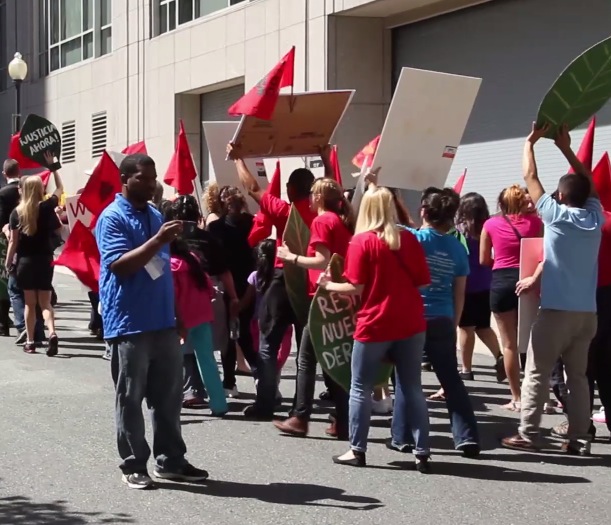Last week, members of the Farm Labor Organizing Committee (FLOC) joined allies and activists from across the state in protesting Reynolds American Inc.’s treatment of farmworkers. Last year, Reynolds earned $1.3 billion in profits, but the company has hesitated to take proactive steps in guaranteeing good housing and fair pay to the workers at the very heart of its supply chain. Here at the NC Council of Churches, we have long supported farmworkers’ rights to living wages and dignity on the job. No one should have to work in slave-like conditions to provide for their family. Corporations should take responsibility for their supply chains, and the people whose labor makes possible their profits.
Here’s more on the day from the Winston-Salem Journal:
[FLOC President Baldemar] Velasquez said that while he appreciates how far Reynolds has moved in its willingness to discuss farm worker issues, he questions why executives won’t sign an agreement guaranteeing the right to organize and collectively bargain for all farm workers in their supply chain. He encouraged Reynolds to write its support of farm-worker rights into its corporate social responsibility policy, similar to what Philip Morris USA and British American Tobacco have done in recent years.
“We are glad that the cries of the harvesters have reached the board of directors,” Velasquez said, paraphrasing James 5:4 from the New Testament. “We see the company taking some action on these elusive issues, but you can be in compliance with regulations and not be in compliance with the human condition.
“I invite the board to take off their corporate shoes, put on some jeans and come to the pits of the tobacco farms during stroke season (July and August) and tell me the growers are providing an appropriate environment for these workers. They’ll get a more honest understanding, rather than the answers you tend to get from farm workers knowing they are talking to company-contracted auditors.”
Velasquez and other advocates pushed Reynolds to take a corporate stance in support of immigration reform, since 90 percent of tobacco farm workers are undocumented. Wajnert said Reynolds has no plans to take a stance.
“We believe Reynolds has the power to help some transformative change happen with farm worker rights, not just in the tobacco fields, but all fields,” Velasquez said.
And click here to learn more about how you can get involved with FLOC.
-Chris Liu-Beers, Program Associate

